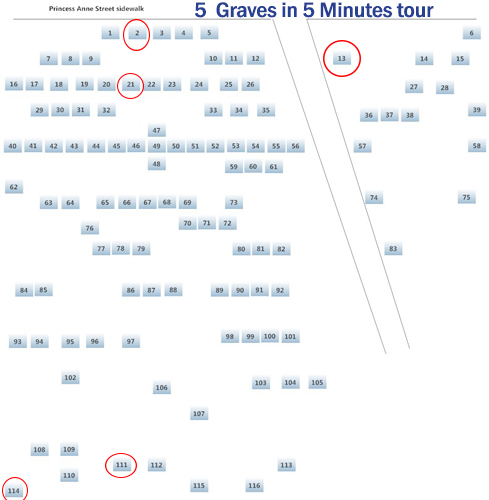
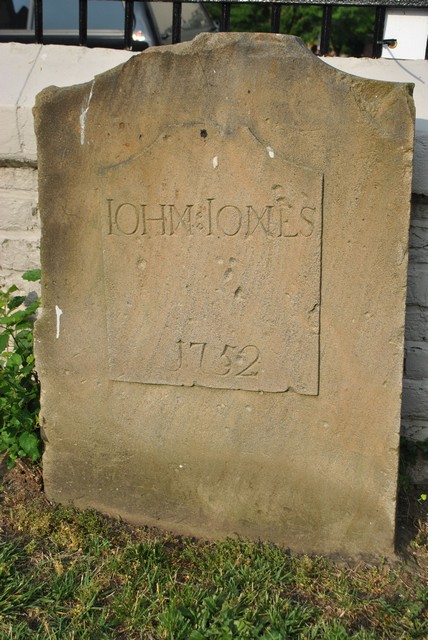
This is our oldest known grave, 1752, John Jones. Jones owned a tavern in what was called the “upper neighborhood” on the corner of Amelia and Caroline It was in the upper end of the town that an assembly of Scotsmen congregated and socialized at the neighborhood tavern of John Jones. Some were managers of Glasgow franchises. Some were political refugees from the conflict with England. Hugh Mercer (who came a bit later) and John Sutherland were doctors. By now, Col. Lewis’ store was established just outside the town line.

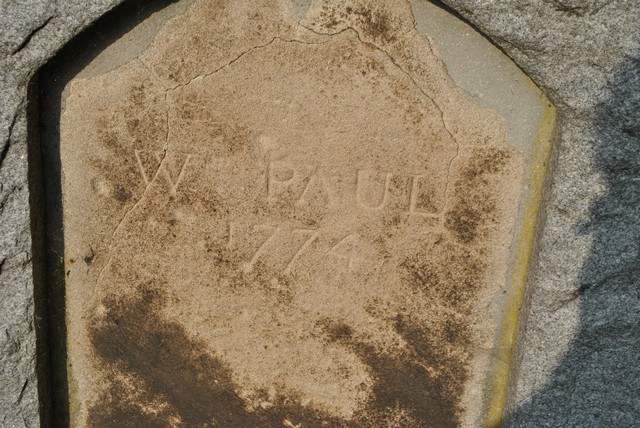
William Paul was the brother of John Paul Jones.
William Paul conducted a tailor shop in Fredericksburg. William prospered sufficiently to purchase from Thomas Blanton, a carpenter, a house and lot in Fredericksburg in June 1770. It stood on a substantial parcel at the corner of Caroline Street and Lafayette Boulevard.
The last four years of his life were trouble-ridden. He was in court more than once, presumably suing clients. About the time he acquired the house, he also acquired a wife, Fanny, and a stormy marriage!
He died in 1773, and his executors, (as appointed by him) William Templeman and Isaac Heslop declined to serve, and it was not until November, 1774, that anything was done about the estate. It is assumed that John Paul Jones arrived here then. Jones knew Fredericksburg having visited Fredericksburg 1761,1762,1763 repairing ships and then loading cargo – tobacco, pig iron, barrel staves
Jones acquired his last name due to a murder in the West Indies. He was assultated by mutinous crew member whom he killed in self-defense. There was no sitting court to hear case, he fled America . He took Jones possibly in the 20 months where his whereabouts cannot be traced .
This gravestone, 1930, encompasses the original grave which is on the back of this stone.
#21 Virginia Patton (1852-1924)

Jones was the first buried here and Patton the last in 1924. The Graveyard was closed to further burials. However, since 2008 cremains have buried along Faulkner Hall wall. You can see a plaque there. Thus the graveyard continues to serve the community
Buck Patton her husband was a cousin of General George Patton. Both are descended Robert William Patton (1750 – 1828) of Scotland. George Patton’s father was killed in the Civil War. Due to the economic struggles after the Civil War his part of the family migrated to California.
Buck Patton was a merchant living and served in Fredericksburg Virginia Light Artillery during the Civil War He was discharged from combat duty due to disability, chronic rheumatism, on November 1862. He was detailed 6/1863 Richmond, VA. to serve as a clerk in the Medical Director’s Office.
#114 Col John Dandridge (1700-1756)

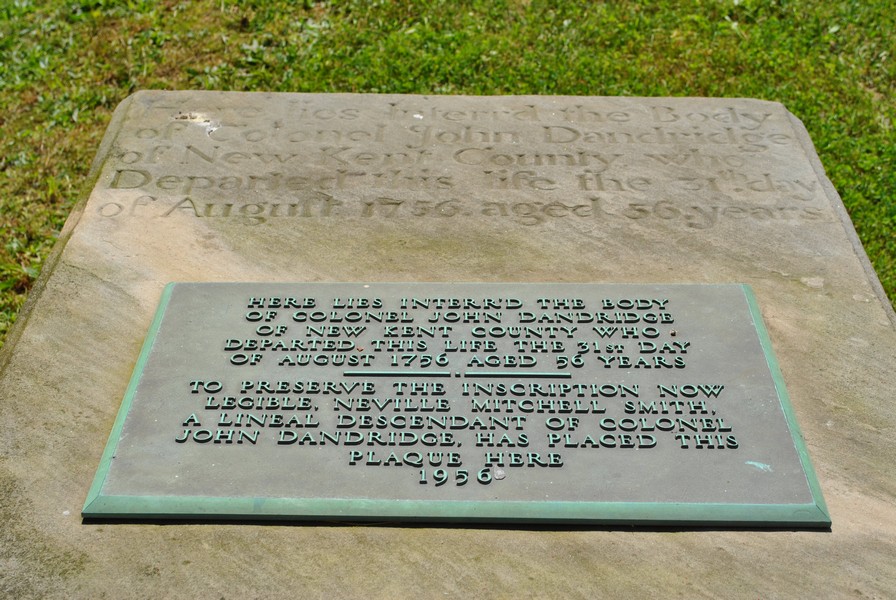
Colonel John Dandridge was the father-in-law for George Washington.. He had grant of a water front lot in Hampton, Elizabeth City County. His children were all born there. He served as County Clerk, which is those days (Colonial days) was considered a very lucrative position.
Colonel Dandridge married Frances Jones, daughter of Orlando Jones on July 22, 1730. He was the father of Martha Dandridge who married first Daniel Parks Custis and then secondly George Washington.
He died on August 31, 1756, aged 56 years. Historians do not seem to know why he died in Fredericksburg. Some state that he was here visiting his daughter, Martha who married General Washington, but that cannot be true because he died more than two years before his daughter was married. It was possible he was here attending races at “Chatham”, held by William Fitzhugh.
This grave was lost for over 50 years after the building of St. George’s in 1849. Apparently his grave was covered up and only workmen in the early part of the 20th century uncovered him.
#111 Rev. Edward McGuire (1793-1858)
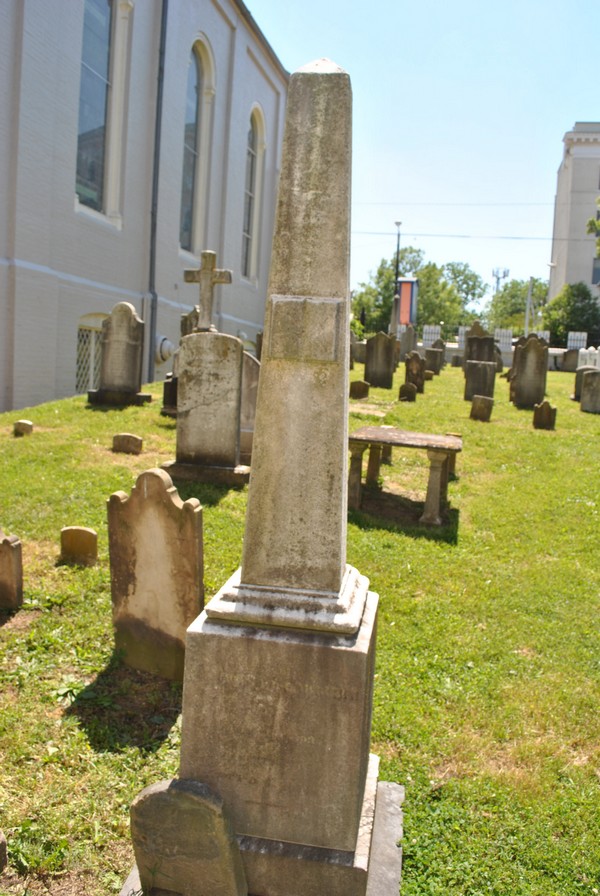
McGuire was our longest serving rector from 1813-1858. He was involved with all 3 St George’s churches including the current church of 1849.
What accounts for his success? He was a church builder first and foremost at St. George’s. At his death, the newspapers wrote many accolades and focused on the numbers he brought to the Church. The Fredericksburg News wrote on October 12, 1858 wrote “Under his faithful culture his congregation has greatly multiplied in numbers and flourished in all of its highest spiritual interests” The Weekly Advertiser at the same time noted he had baptized a whole generation in his communion and increased the church from a mere handful to hundreds. From a small number when he arrived the Church had grown to 259 communicants a year after his death.
He was an evangelical, spreading the “good news” through action and participation. The qualities noted in the plaque – amiable in character, prudent in action, sound judgment and consistent conduct united both his work as a builder and evangelical. McGuire came here as a lay reader since he was too young at age 20 to be ordained in 1813. He was ordained in 1814. He was never trained in a seminary but read with three ministers, including two future leaders in the Church, Rev. William Meade, rector of Christ Church in Alexandria and then with Rev William Wilmer, rector of St. Paul’s in the same city. He entered the church at a time of disarray. Carroll Quenzel in his history of St. George’s corroborates this point. When he came there were “less than a dozen” in the Church. He reports the congregation was in a “state of complete prostration” where those that remained were much “discouraged.”
He held frequent services (6 or 7 times a week) and performed baptisms often after morning services as well as preaching in Falmouth in the afternoon. By the late 1840’s Philip Slaughter in his history reported he had baptized 807 persons, including 50 adults and married 524. Just before his death in 1858 he had presented 88 people to Bishop Meade for confirmation, certainly a high point in his ministry. Joseph Packard, a professor at Virginia Theological Seminary, writes that “McGuire not only built up his own parish, but went through Spotsylvania, Stafford, Essex, Caroline, Culpeper and Organ counties preaching and visiting. “ McGuire was able to personalize religion based on his own religious struggle.